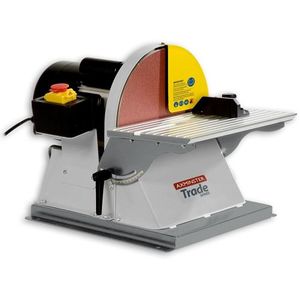Disc Sander: Difference between revisions
From DT Online
m (Added Note:) |
m (Improved presentation) |
||
| Line 1: | Line 1: | ||
[[File:DiscSander.jpg| | [[File:DiscSander.jpg|300px|right]] | ||
[http://en.wikipedia.org/wiki/Sander '''Disc Sanders'''] can be used to shape the ends and edges of shapes in timber or plastics. Sanding discs are approx. 300mm dia and available in a variety of '''[[Abrasives|grit sizes]]''' but a fairly coarse 60 or 80 grit should be chosen for general work because the speed of the machine may quickly burn out a finer grit. | [http://en.wikipedia.org/wiki/Sander '''Disc Sanders'''] can be used to shape the ends and edges of shapes in timber or plastics. Sanding discs are approx. 300mm dia and available in a variety of '''[[Abrasives|grit sizes]]''' but a fairly coarse 60 or 80 grit should be chosen for general work because the speed of the machine may quickly burn out a finer grit. | ||
---- | ---- | ||
Revision as of 20:43, 25 November 2014
Disc Sanders can be used to shape the ends and edges of shapes in timber or plastics. Sanding discs are approx. 300mm dia and available in a variety of grit sizes but a fairly coarse 60 or 80 grit should be chosen for general work because the speed of the machine may quickly burn out a finer grit.
Note: Gluing a cork tile on to the metal disc (e.g. with contact adhesive) before gluing on the sanding disc (e.g. with ‘Cow Gum’ or similar) can help to cushion the sanding surface.
Safety Point! All workshop machines can be dangerous - do not use any machine until you have been trained to do so. Wear eye protection. Sanding dust can be harmful so avoid inhalation by providing dust extraction and/or using a face mask.
